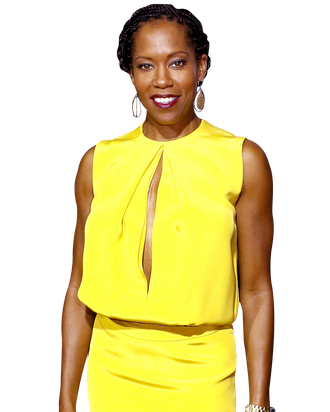
Last night, The Leftovers put forth one of its most intense and riveting scenes between Erica Wright (Regina King) and Nora Durst (Carrie Coon). We sat down with Regina King and asked her what it was like to film that scene, and why she doesn’t mind making people uncomfortable.
When you won your Emmy this year, it felt like you were being recognized for an overall outstanding career.
There was never really a moment of heavy disappointment when I might not have been nominated for something, because from Boyz n the Hood on I’ve had nothing but people tell me that I made them feel a certain way. That’s really my reward — you know, either hopefully they love it, or say, “Oh my God, I cannot watch it just because it makes me feel so uncomfortable.”
And you’re like “good.”
Yes! That’s how you’re supposed to feel! Score! I was telling someone, “I guess it’s no surprise that I like shit that makes you feel uncomfortable.” It is a pattern now.
But Erica is uncomfortable in the most fascinating way. She’s been this through line of calm …
But eerily calm. Like you know there’s something there.
That scene between you and Nora is one of the most terrifying moments of TV I have ever seen. It’s fascinating to me that you were able to be so evocative about things that are so uncomfortable.
That’s part of why I love the art form, because you have the opportunity to do that and say, “I was just acting!” You don’t really have to own it. When I signed on to do The Leftovers, one of my hopes and desires was that I would get to have a scene with Carrie Coon. I didn’t know if it would happen or not, but then we got that script, and we saw it was an eight-page scene. We were working and happened to pass [each other] in the makeup trailer and we were both just like [jaw drops]. And it was that moment, when you’re looking into another actress’s eyes, when you both at the same time think without saying it, this is why I do this, this is why I do this. And no rehearsing — you know that that’s an actress who’s strong and she’s going to know her lines, and if she knows it then I’m going to know my lines. It’s just almost like going in and having a Serena-Sharapova tennis match.
That’s intense.
You don’t know who’s going to come out on top. It can go either way.
Was there an emotional intensity in how you were performing as well, while were you feeling all of that?
I get chills when I think about us that day shooting that scene. You sleep like a baby that night because you are using so much energy with an actor that really respects the art. We turn that camera on and I’m giving you 100 percent. They shot my coverage first and Carrie gave me 100 percent. I mean, the whole episode is just [Erika] talking about the birds and her family, but I mean that scene …
What I also love is that this show has a theme of independent mothers, and this is a scene where Erica is saying, “I was going to leave my family.”
And that was some cold shit! I didn’t see that one coming. When I read the script I was like, “Ooooh! Whoa!”
So how does that affect you as a mother? Amy Brenneman talked to Vulture about how that stuff has been very hard for her.
Reading that script the first thing I thought is “No! No! No, Erica! I need to call Damon [Lindelof], he’s given me something wrong here because this is not who Erica is.” And then I walked away from it and came back and read it again and then I was like, there’s an opportunity here. There’s an opportunity here to do something really different. I already think he’s amazing as a writer, but the lightbulb went on, like, “Oh, God, no, you have to embrace this.” You don’t get to see us in that role — the Murphys just happen to be black, but it’s not discussed.
They’re just a family.
So here’s an opportunity for me to possibly represent a woman that seemingly has it all together but wants to run. “How must that feel? How do you make that decision? Does she really have a plan?” These are questions I am asking Erica. “Do you really have a plan?” I don’t think she did.
And you’re right, black women — and most actresses — never get to play different kinds of moms, and never get to play women who deviate from the script.
And the reality is that there are women who look like me that do. Every now and then you hear that story where you meet a man whose wife left and he raised his kids and you go, “I want to meet her!” because I want to know “how the fuck did you do that?”
Culturally, we do not give women that space.
We do not. We don’t give them that space. And we assume that they were okay with it. [For Erica] to feel like this, and the decision to do this, doesn’t mean that she was okay with making that decision, but she had to.
What does it mean to you to portray someone with such a deep interior life? This is not the first time you’ve done that. Is that rewarding for you?
It’s cathartic in a lot of ways. I think a lot of actors might say that. You know, it’s probably my opportunity to escape when I want to.
Do you look for that catharsis now?
Yes. Yeah, because why not? Why not.




